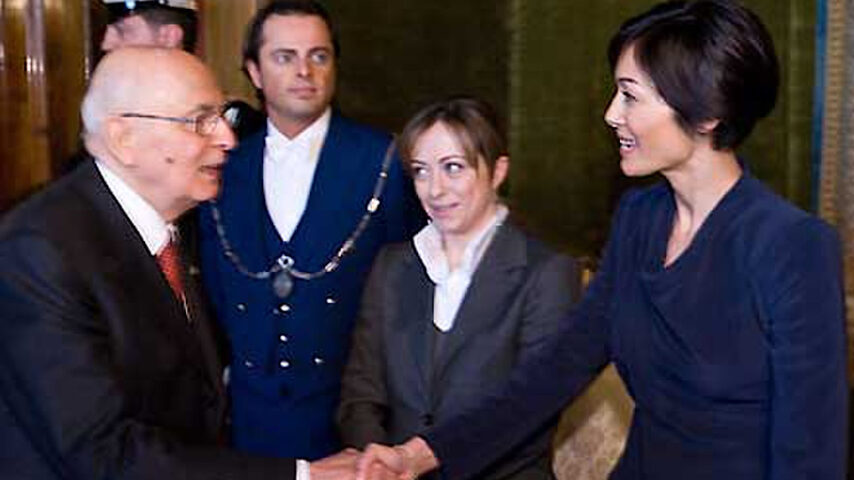She’s the conservative firebrand tipped to be crowned Italy’s first ever female Prime Minister in the country’s snap election later this month. But who exactly is Giorgia Meloni, and what is she offering to Italian voters?
The 45-year-old unmarried mother of a five-year-old daughter, born in a working class area of Rome, has been a professional politician from a very young age.
While she excelled at school, Meloni could not afford to go to university after her father left the family when she was eleven, leaving her mother to raise two girls.
She worked in all sorts of jobs – including as a babysitter, a nanny, a market stall holder, a waitress, and a bartender at the Piper Club, one of Rome’s most famous nightclubs.
She entered politics in 1992 at the age of just fifteen. Writing about that decision in her recent best-selling autobiography, Meloni explains that her motivation came as a result of the Sicilian mafia killing two of Italy’s top anti-mafia prosecuting judges, an act which essentially saw the mafia declare war on the Italian State. She recalls in her autobiography that she felt desperate to do something in the wake of the killings.
In 1992, she joined the Youth Front, a youth-wing of the post-facist national conservative Italian social movement (MSI) sparked by her belief that it was one of the few movements which appeared to be untainted by the corruption and ineffectiveness of Italian politicians.
In 1996, she became the national leader of Student Action, the student movement of National Alliance, the right-wing successor of the MSI. In 1998, after winning the primary election, she became a councillor for the Province of Rome, holding the position until 2002. In 2000, she was elected national director, and in 2004, she became the first female president of the party’s youth wing, Youth Action.
In 2006, coinciding with the start of her career as a journalist, she was elected to the Chamber of Deputies in 2006, becoming the youngest ever vice-president in its history.
Under former Italian Prime Minister Silvio Berlusconi, she served as Minister for Youth from 2008 to November 2011, when Berlusconi was forced to resign amid Italy’s financial crisis. She became the youngest ever Minister in the history of a united Italy.

She now identifies as a Conservative, and leads the Italian Brothers’ Party, Italy’s main centre-right party. According to recent polls, under Meloni’s leadership, it is now the largest party in Italy. Meloni says the incredible growth of the party is testament to the fact that “the truth of their ideas is ultimately what people are seeking”.
A large part of her appeal appears to be found in her sense of authenticity, the down-to-earth, unpolished persona she has built for herself, along with the fact she is media-savvy, and still young. She has also been fortunate, in the eyes of commentators, to have gained prominence at a time when her main rivals on the right, Berlusconi and Salvani are in crisis mode. Perhaps the most significant factor which explains her meteoric rise to prominence is her perceived unflinching consistency on policy.
Her emphasis on Christian values has seen that become her defining issue. In 2019, she delivered a now-famous speech in which she declared in her heavy Roman accent: “I am Giorgia, I am a woman, I am a mother, I am a Christian”. The speech went viral, becoming a sensation on TikTok, and was even made into a disco remix.
One speech, delivered when she spoke at the 13th World Congress on Families, has recently resurfaced, hitting 44,000 views on YouTube in a matter of days.
During the impassioned address, she received rousing applause for her defence of the family, and her vow to fight back against gender ideology:
https://www.youtube.com/watch?app=desktop&v=fCGK6N9K83M
Meloni has also been described as an Atlanticist, and pro-America. She travelled to the Conservative Political Action Conference (CPAC) in February of this year to address conservatives, becoming the first ever Italian speaker at the renowned event.
“We live in a time in which everything we stand for is under attack,” she told CPAC.
“Our individual freedom is under attack. Our rights are under attack. The sovereignty of our own nation is under attack. The prosperity and well-being of our families is under attack. The education of our children is under attack. People understand that in this age the only way of being rebels is to preserve what we are. The only way of being rebels is to be conservatives”.
“We are going to say it loud; we’re not going to care about the labels they stick upon us. We are fed up of a left that lectures us even on what the right should be, what it should do, how it should behave, and even, how it should define itself”.

“The left would do better to try recovering its own identity. We on the right know exactly who we are and what we stand for,” Meloni said, in the same tone of defiance and decisiveness which has made her equally admired and hated.
Meloni has expressed personal opposition to abortion, criticising the abortion regime in the past. She made headlines recently when an Italian influencer and model criticised her party’s objective of limiting abortion in the country, where around two-thirds of doctors there, many citing their Catholic faith, conscientiously refuse to perform abortions.
Although Meloni is on record as supporting Italy’s nine-week abortion law, something that will not sit comfortably with many of her Catholic and Conservative supporters, it is likely an issue that hits close to home. When Meloni’s mother found out she was pregnant, Meloni’s father, an accountant, said he did not want a second child, so her mother had booked an abortion. On her way to the abortion centre, she stopped at a bar, drank a cappuccino, ate a brioche, and realised she had doubts about her decision as per an interview with Meloni in The Spectator.
Indeed, Meloni has been praised for having a heart for mothers and babies — while she was against the historic introduction of the dole for the first time ever in Italy, she is in favour of helping make it easier financially for women to have and raise children.
She supports the idea of a maternity wage as ‘a beautiful idea’ but points to the fact there is already child benefit available for mothers. Instead, she supports the idea of free daycares that are open for longer, maternity leave paid for by the state rather than the employer, as well as lowering the tax burden on those who have children.
The fact that Italy has one of Europe’s lowest birth rates (1.2 children per woman), is a pressing problem in the eyes of Meloni. She has expressed her view that the only way in which the problem can be solved is through making it more appealing for Italians to have children. Women, she says, don’t want to have children because society punishes them and makes them pay if they do. She believes mothers must be rewarded by society rather than being punished. One of the central policies of her party is to try and increase Italy’s notoriously low birth rate, and to try and help build traditional families, something which has won her support amid an Italian birth rate crisis, which if it goes unabated, will see it’s population decline from 60 million to 40 million by the end of the century. Many believe Meloni and her party have what it takes to address Italy’s impending demographic disaster.
She stood against gay civil unions, which were made legal in Italy in 2016. Now, she says she accepts them — but is an opponent of gay adoption, saying all children should have the right to have a mother and a father.
As the Italian general election looms, Meloni, a woman never far from the spotlight, recently came in for fresh criticism over a 1996 speech she made aged 19, in support of Benito Mussolini, Founder of the Italian Fascist Party.
In her recent interview with The Spectator, she distanced herself from any links to fascism, pointing to a declaration she made in 2006, which was published by a left-wing journalist:
She told the journalist: “Mussolini made various mistakes: the racial laws against the Jews, the declaration of war, an authoritarian regime. Historically he also did other things that were good, but that does not save him”.
In an interview with The Telegraph, she also addressed the controversy, declaring in video message:
“The Italian Right has handed fascism over to history for decades now, unambiguously condemning the suppression of democracy and the ignominious anti-Jewish laws”.
Regardless of the controversy that surrounds her, and the disdain shown to her by much of the international media, it has to be said that Meloni has won significant popularity for her ability to speak her mind fearlessly. She has courage in her convictions. She does things her own way. She refuses to accept the labels slammed on her by opponents, and her impassioned stand for ‘God, country and family’ has no doubt inspired huge support. It could very well lead her on the path to victory.